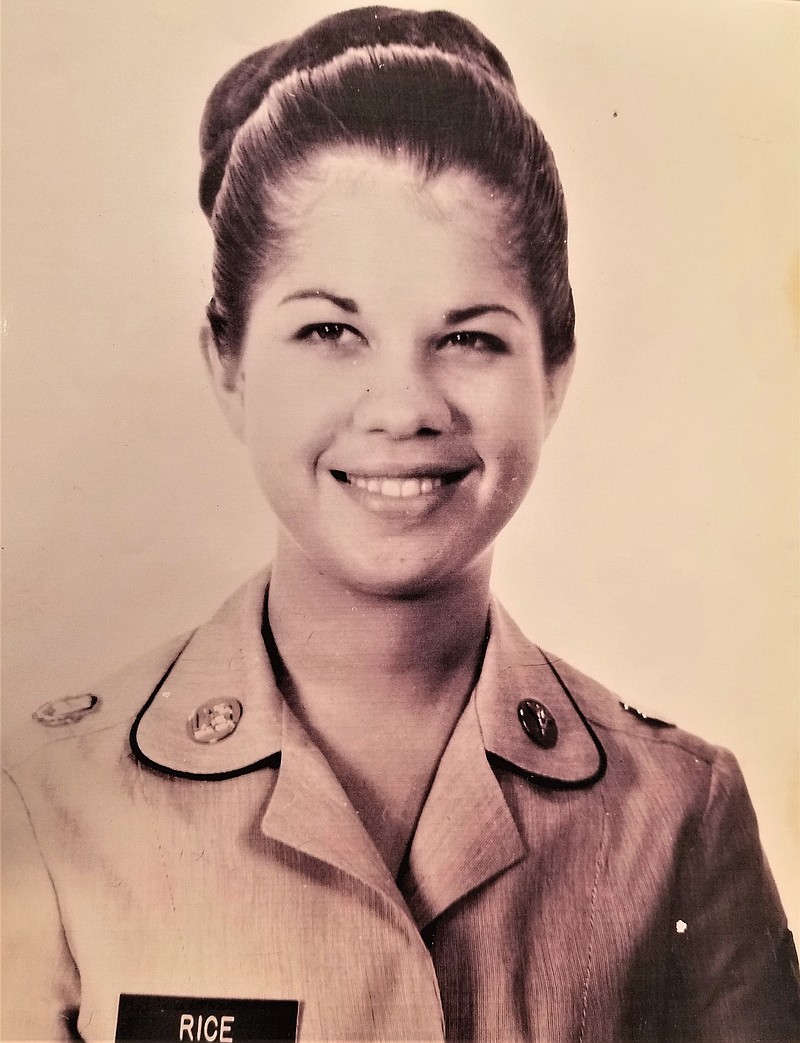There were many states Sharon Grant called home while growing up since she had to move when her father, who served in the U.S. Navy, changed duty assignments. As she approached adulthood, her father retired from service and settled his family in Iowa, where his daughter went on to graduate from high school and later chose to pursue her own interest in serving her country.
"After I graduated in 1966, I attended community college in Marshalltown, Iowa, and then transferred to University of Northern Iowa," Grant explained. "This was during the Vietnam War, and I soon decided I wanted to do something to support all the young men being sent overseas."
Having worked in a dental office during her senior year of high school, the U.S. Army promised her training as a dental hygienist. In January 1969, she enlisted in the Women's Army Corps, which had been established as an auxiliary unit of the U.S. Army during World War II to afford women opportunities to serve in non-combat roles.
Almost immediately, she was sent to Fort McClellan, Alabama, the first permanent home for the U.S. Women's Army Corps Center. She remained on the military base for several weeks to complete her basic training and was then transferred to San Antonio, Texas, for the basic dental course.
"During that particular course, we were taught basic dental procedures and learned to assist the dentists in their responsibilities," she explained.
The young soldier was then transferred to Fort Rucker, Alabama, where she worked in a dental clinic for several weeks until her next dental training course came available. In December 1969, she returned to San Antonio to complete the U.S. Army school in dental hygiene.
When she arrived for the school, it was days before the two-week break for the Christmas holiday. Rather than stay in the barracks and strip floors, she volunteered to work in the dental clinic - a decision that introduced her to a renowned politician of the era.
"President (Lyndon) Johnson, who was no longer president at that time, came to the clinic for some dental work," she said. "That was an exciting opportunity because I got to assist with the procedure."
She remained in training in San Antonio through early spring of 1970, receiving detailed dental instruction in cleaning teeth and fluoride application. From there, she was transferred to her first permanent duty assignment at Fort Rucker.
"That's where the Army was doing advanced flight training for Huey pilots," Grant said. "I was assigned as a dental hygienist at the dependent clinic, where we treated the spouses and children of the service members."
While there, she met Thomas Barnett, a native of Indiana who was in flight training. The couple soon began dating, and when the aviator received orders for deployment to Vietnam, they agreed to get married after he returned from his overseas service.
"Tom was sent to Vietnam in the summer of 1971," she recalled. "His helicopter was shot down during a rescue mission that he volunteered for in September; he was the only one of the crew to survive the crash."
Tearfully, she added, "He was paralyzed and died a month later from pneumonia in a hospital in Vietnam."
The loss of her boyfriend became a wound that never fully healed, but Grant continued to immerse herself in her duties at the dental clinic at Fort Rucker. Months later; however, she followed in the footsteps of her beloved Barnett when deploying to Vietnam in March 1972.
Arriving in Long Binh, she spent several months working at a clinic as part of the WAC detachment at the base. Then, after the detachment returned to the United States, Grant transferred to a regular Army unit in Saigon that was in the process of turning their equipment over to the South Vietnamese.
"I lived in a hotel at Saigon and a couple of times a week, I flew to several jungle provinces with an advisory team that was training the South Vietnamese Army," she related. "I supported a dental surgeon that was part of the team and we provided dental care during these missions for both Americans and occasionally the South Vietnamese."
For her "untiring efforts" and willingness to volunteer for the advisory teams as part of the 38th United States Medical Group Staff, Staff Sgt. Grant was awarded a Civil Actions Medal.
Leaving the country in December 1972, she returned to the United States and remained in the Army until 1975, completing additional service at the Presidio of Monterey and in Okinawa. In the years following her discharge, she has encountered difficulties related to her service in Vietnam, which has left her with emotional trauma that she has addressed through counseling.
She went on to pursue an education, using her GI Bill to earn a master's degree in social work. Her master's thesis was published and widely embraced since it was the first large-scale study to review health outcomes for women who served in the Vietnam War. She was later employed by the California Youth Authority in Sacramento and taught in the local schools there for five years.
In 2002, after experiencing some health issues, she moved to Jefferson City to be closer to her sister. The mother of one daughter, Grant explained although she has encountered her own challenges related to post-traumatic stress, she remains proud of her service and the support she and other women provided during the war.
"I was really in a unique position in Vietnam because there were so few women who served there," Grant said. "We fulfilled important roles in the war and I think we became a valued part of history."
She concluded, "The nation was divided back home during the war and there was a lot of 18- and 19-year-olds being sent overseas to fight, but I felt patriotic and just wanted to do my part."
Jeremy P. Amick writes on behalf of the Silver Star Families of America.

